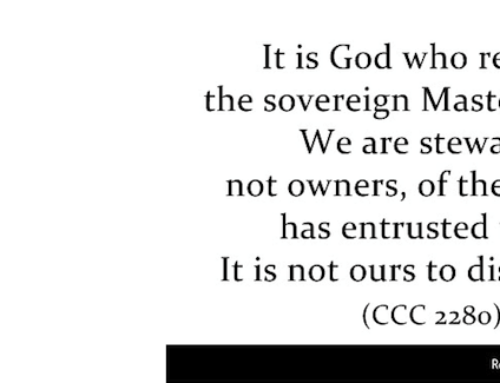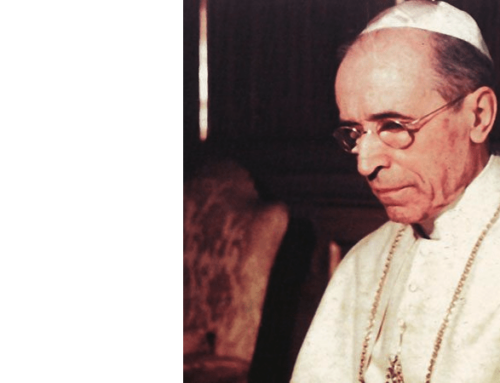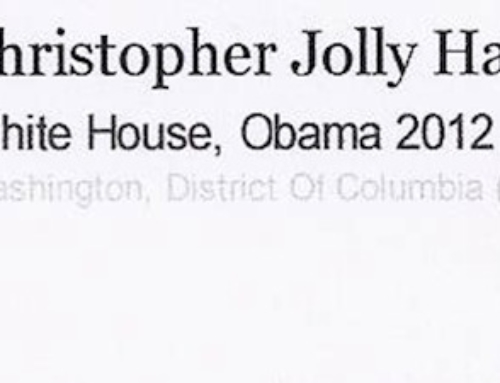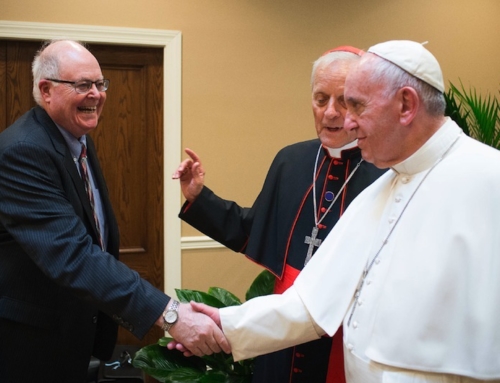by William A. Donohue
(Catalyst 3/1996)
Mother Teresa has “deceived” us. Her work with the poor is done not for its own sake, but to “propagandize one highly subjective view of human nature.” She is “a religious fundamentalist, a political operative, a primitive sermonizer and accomplice of worldly secular powers.” Furthermore, the Albanian nun is “a demagogue, an obscurantist and a servant of earthly powers.” She keeps company with “frauds, crooks and exploiters,” and takes in millions of unaccounted for dollars.
If this sounds like nonsense, well, it is. But it is also the way Christopher Hitchens looks at Mother Teresa. His book, The Missionary Position: Mother Teresa in Theory and Practice, is a sequel to his British television “documentary” entitled “Hell’s Angel.” The sexual message implied in the book’s title demonstrates that Hitchens never escaped adolescence, and both the book and the film are designed to get the public to hate Mother Teresa the way he does. That he hasn’t fooled even the Village Voice, which took note of Hitchens’ hidden agenda “to prove all religion equally false,” must be disconcerting for the author. After all, if the alienated can’t be fooled, it’s time for Hitchens to pack it in.
Christopher Hitchens is a British transplant, a political pundit who has written a column for the Nation magazine for decades. The Nation, for the unacquainted, is a magazine that would put a smile on the face of Joseph Stalin. (Speaking of Stalin, it is not unimportant that Hitchens’ father was a gunrunner for Old Joe, proving once again the maxim “the apple doesn’t fall far from the tree.”) Hitchens has also written many books, none of them of any consequence, and has now found a new home writing for Vanity Fair. Having spent his entire adult life on the wrong side of history, he has become a very bitter and angry man.
Why does Hitchens hate Mother Teresa? Like Mother Teresa, Hitchens is troubled by poverty. Unlike her, he does nothing about it. What upsets him most is that the world’s greatest champion of the dispossessed is an unassuming nun. Hitchens would prefer to grant the award to ideology, namely to the politics of socialism. And because he is a determined atheist, he cannot come to terms with Mother Teresa’s spirituality and the millions who adore her. More than this, it is her Catholicism that drives him mad.
Even some of Hitchens’ fellow leftists have noticed his deep-seated hatred of Catholicism. In the 1980s, Robert Orsi accused Hitchens of continuing “a shameful Nation tradition of anti-Catholicism,” adding that “Hitchens’s straightforward hatred of Catholics is offensive and ugly prejudice.” It is to be expected, then, that anyone as well received as Mother Teresa would be too much for Hitchens to bear.
As expected, Mother Teresa has won scores of awards from all over the world. This bothers Hitchens. What has she done with the money earned from the awards? He doesn’t know, but that doesn’t stop him from saying “nobody has ever asked what became of the funds.” Not true. He has asked, so why doesn’t he tell us what he found? Because that would take work. Worse than that, he would then have to confront the truth. This is why he would rather imply that Mother Teresa is sticking the loot in her pocket. It’s easier this way.
His book, by the way, is a 98 page essay printed on eight-and-a-half by five-and-a-half inch paper, one that is so small it could easily fit into the opening of a sewer. It contains no footnotes, no citations of any kind. There is a role for this genre, but it is not associated with serious scholarship, and it certainly isn’t associated with works that make strong allegations against public persons. Rather, it is associated with the gossip pages of, say, a Vanity Fair.
Hitchens doesn’t like rich people (save for those obsessed with guilt and who give to “progressive” causes) and that explains why he doesn’t like it when Mother Teresa takes money from the wealthy. But it wouldn’t bother Hitchens if she took money from the government, because that would make her a real redistributionist. From this perspective, Robin Hood is a game that only collectivists can play.
In the promotion flyer accompanying the book, the publisher delights in saying that Hitchens outlines Mother Teresa’s relationship with “Paul Keating, the man now serving a ten-year sentence for his central role in the United States Savings and Loan scandal.” Wrong, the man’s name is Charles Keating, but what difference does that make to a publisher unconcerned with verifying the sources of its authors?
Keating gave Mother Teresa one and a quarter million dollars. It does not matter to Hitchens that all of the money was spent before anyone ever knew of his shenanigans. What matters is that Mother Teresa gave to the poor a lot of money taken from a rich guy who later went to jail. But her biggest crime, according to Hitchens, was writing a letter to Judge Lance Ito (yeah, the same one) “seeking clemency for Mr. Keating.”
It would be rather audacious of Mother Teresa if she were to intervene in a trial “seeking clemency” for the accused, unless, of course, she had evidence that the accused was innocent. But she did nothing of the kind: what she wrote to Judge Ito was a reference letter, not a missive “seeking clemency.”
“I do not know anything about Mr. Charles Keating’s work,” Mother Teresa said, “or his business or the matters you are dealing with.” She then explains her letter by saying “Mr. Keating has done much to help the poor, which is why I am writing to you on his behalf.”
Now why this character reference, written of someone who was presumed innocent at the time, should be grounds for condemnation is truly remarkable. It reveals more about Hitchens than his subject that he brands her letter an appeal for “clemency.” It was nothing of the sort, but this matters little to someone filled with rage.
Here’s another example of how Hitchens proceeds. He begins one chapter quoting Mother Teresa on why her congregation has taken a special vow to work for the poor. “This vow,” she exclaimed, “means that we cannot work for the rich; neither can we accept money for the work we do. Ours has to be a free service, and to the poor.” A few pages later, after citing numerous cash awards that her order has received, Hitchens writes “if she is claiming that the order does not solicit money from the rich and powerful, or accept it from them, this is easily shown to be false.”
Hitchens isn’t being sloppy here, just dishonest. He knows full well that there is a world of difference between soliciting money from the rich and working for them. Furthermore, he knows full well that Mother Teresa never even implied that she wouldn’t accept money from the rich. And precisely whom should she–or anyone else–accept money from, if not the rich? Would it make Hitchens feel better if the middle class were tapped and the rich got off scot free? Would it make any sense to take from the poor and then give it back to them? Who’s left?
Hitchens lets the reader know that there aren’t too many people that he likes. On this, he is bipartisan. He doesn’t like Hillary Clinton (she “almost single-handedly destroyed a coalition on national health care that had taken a quarter century to build and nurture”), Marion Barry (responsible for corruption and the crime of “calling for mandatory prayer in the schools”) or Ronald Reagan (his sins are too long to cite here). As such, he objects to Mother Teresa being photographed with them. Now if only she had posed with the characters who hangout at the Marxist Institute for Policy Studies (a favorite Hitchens cell), she would have escaped his wrath altogether.
Hitchens also hates Mother Teresa’s itinerary, charging that there is a political motive to her travels. For example, in 1984 she went to comfort the suffering in Bhopal after a Union Carbide chemical explosion. While there, she asked that forgiveness be given to those responsible for the plant (the Indian government was mostly to blame, though Hitchens, the inveterate anti-capitalist, cannot admit to this). So what does Hitchens make of this?
He takes great umbrage at her right to ask for forgiveness, questioning who “authorized” her to dispense with such virtues in the first place. For Hitchens, her refusal to answer this question (never mind that she was never asked in the first place) is proof positive that her trip “read like a hasty exercise in damage control.” Damage control for whom? Union Carbide? Does Hitchens even have a picture of Mother Teresa and a Union Carbide official to show?
Hitchens smells politics whenever Mother Teresa supports moral causes he objects to. For example, in 1988, while in London tending to the homeless, Mother Teresa was asked to meet with Prime Minister Margaret Thatcher. She did. She also met a pro-life legislator. So? For Hitchens, this shows the political side of Mother Teresa. Forget for a moment that Mother Teresa is perhaps the most noted pro-life advocate alive, and that abortion is first and foremost a moral issue. And does anyone doubt that had she met with a politician interested in socialized medicine, Hitchens would be citing her humanity, not her politics?
Mother Teresa has tended to the sick and poor all over the world. She doesn’t pick and choose which countries to go to on the basis of internal politics, and this explains why she has visited both right-wing repressive nations like Haiti and left-wing repressive nations like Albania. Hitchens can’t stomach this and indicts Mother Teresa for servicing dictatorships. Now if his logic is to be followed here, then most Peace Corps workers and Red Cross personnel are guilty of courting despots. This may make sense to those who write for the Nation, but no one else can be expected to believe it.
It would be a mistake to think that Hitchens is a principled opponent of dictatorships. What matters is whether he believes the regime is sufficiently utopian in its leftist politics to merit his approval (this is why Albania doesn’t qualify–it was just an old fashioned tyranny). Allende’s Chile, however, is a different story.
In 1983, Hitchens lamented the “tenth anniversary of the slaughter of Chilean democracy” under Salvador Allende. This is a strange way to characterize thuggery. Corrupt and despotic, Allende welcomed terrorists from all over Latin America, bankrupted the poor with runaway inflation, locked up dissidents, installed a censorial press and abused the court system in an unprecedented manner. But despite his record, Allende was the darling of Christopher Hitchens, and Western socialists in general, in the early 1970s.
The Sandinistas were the favorites of the Nation crowd in the 1980s. These gangsters fleeced the country, punished the poor (in whose name they served) and instituted mass censorship. Hitchens acknowledges the latter outrage but cannot bring himself to condemn his friends. Censorship, which if practiced by a right-wing regime is called “fascism,” is understood by Hitchens as suggestive of “the crisis of the left in the twentieth century.” And what is this crisis? The resolution of the problem of “individual rights versus the common good.” But Hitchens must be joking, because in reality the left has never been faced with such a democratic dilemma, having long settled the problem squarely in favor of totalitarianism.
In exemplary Catholic fashion, Mother Teresa comes to the poor not out of sentimentality, but out of love. No matter how impoverished and debased the poor are, they are still God’s children, all of whom possess human dignity. This is not something Hitchens can accept. An unrelenting secularist, he cannot comprehend how Mother Teresa can console the terminally ill by saying, “You are suffering like Christ on the cross. So Jesus must be kissing you.”
Hitchens is so far gone that he cannot make sense of Christ’s admonition that “The poor will always be with you.” Not surprisingly, Hitchens says “I remember as a child finding this famous crack rather unsatisfactory. Either one eschews luxury and serves the poor or one does not.” But he just doesn’t get it: Mother Teresa eschews luxury and serves the poor, yet not for a moment does she believe that she is conquering poverty in the meantime. Only someone hopelessly wedded to a materialist vision of the world would think otherwise.
Hitchens also objects to Mother Teresa’s asceticism (if she lived the Life of Riley he would condemn her for that). He charges that her operation in Bengal is “a haphazard and cranky institution which would expose itself to litigation and protest were it run by any branch of the medical profession.” Hitchens would prefer that the Bengalis force Mother Teresa to follow regulations established by the Department of Health and Human Services before attending to her work. It does not matter to him that Mother Teresa and her loyal sisters have managed to do what his saintly bureaucrats have never done–namely to comfort the ill and indigent.
It is a telling commentary on any author when he twists the facts to suit his ends. Hitchens is a master of this and his book is chock full of examples. To cite one, he chastises Mother Teresa for not working cooperatively with the City of New York when she refused to install an elevator in a building she was acquiring to service the homeless. What he doesn’t mention is that the Missionaries of Charity pledged to carry the handicapped up the stairs, making moot the need for an elevator. But for Hitchens to mention this fact would have gotten in the way of his agenda.
It is jealously, not ideology, that propels Hitchens to criticize Mother Teresa for receiving the Nobel Peace Prize. He wonders “what she had ever done, or even claimed to do, for the cause of peace.” (His accent.) This is a strange comment coming as it does from one of those “If You Want Peace, Work For Justice” types. And it apparently never occurred to Hitchens that it is precisely Mother Teresa’s humility that disallows her to grandstand before the world trumpeting her own work. A true crusader for the underclass, Mother Teresa is not in the habit of claiming to do anything. She is too busy practicing what others are content to preach.
If receiving the Nobel Peace Prize angered Hitchens, it is safe to say he suffered from apoplexy when he read Mother Teresa’s acceptance speech. In it, she took the occasion to say that “Today, abortion is the worst evil, and the greatest enemy of peace.” Hitchens labels her speech a “diatribe” that is riddled with “fallacies and distortions,” none of which he identifies, preferring instead to say that there “is not much necessity for identifying” them. Not, it should be added, if your goal is a smear campaign.
It is a staple of secularist thought that contraception and abortion are the best means to ending poverty and population growth. This may explain why people like Mother Teresa are not popular with this crowd, but it is no excuse for cheap ad hominem attacks. Someone who is confident about the logic of his argument doesn’t need to stoop to the gutter to make his point. But Hitchens does just that when he charges that Mother Teresa’s opposition to contraception and abortion “sounds grotesque when uttered by an elderly virgin.” That it is his own utterance about her that is grotesque seems to have escaped him.
What is perhaps most flabbergasting about Hitchens is that he has no idea about the very nature of the problem Mother Teresa is addressing. On one page he writes that “it is difficult to spend any time at all in Calcutta and conclude that what it most needs is a campaign against population control.” Yet on the previous page he notes, with admiration, that in Calcutta “secular-leftist politics predominate.” It is a safe bet that Hitchens will go to grave not understanding that it is the predominance of secular-leftist politics that promotes high levels of population growth and ultimately accounts for the misery of Calcutta.
It is ironic that after hurling one unsubstantiated charge after another that Hitchens ends his little book by saying, “It is past time she [Mother Teresa] was subjected to the rational critique that she has evaded so arrogantly and for so long.” It would be more accurate to say that it is one more source of her greatness that Mother Teresa never evades anything, including irrational tracts written by vindictive authors. The arrogance is all his, because in the end, Hitchens hasn’t even laid a glove on her.







